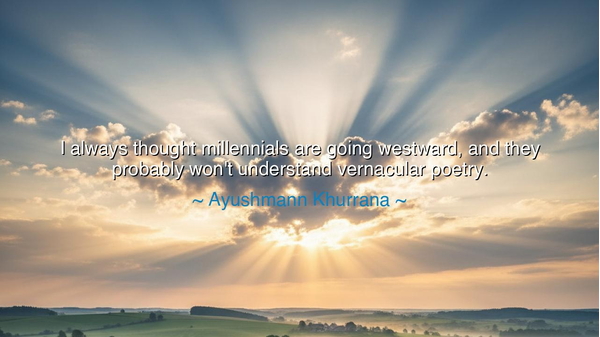
I always thought millennials are going westward, and they
I always thought millennials are going westward, and they probably won't understand vernacular poetry.






Hear now the words of Ayushmann Khurrana, artist of song and story, who spoke with a sigh both tender and troubled: “I always thought millennials are going westward, and they probably won’t understand vernacular poetry.” In these few words lies a reflection on the struggle of a generation—torn between the call of the modern and the memory of the ancient, between the glitter of the global and the rootedness of the local. It is a lament for the treasures of the homeland, spoken in the fear that they may be left behind in the rush toward foreign lights.
For the millennials, children of a changing world, have often been driven to look outward, chasing the dreams of distant lands and foreign tongues. They run toward the westward horizon—toward technology, toward progress, toward a culture that dazzles with speed and spectacle. Yet in this running, there is the danger of forgetting the voice of one’s own soil, the vernacular poetry that sings in the language of ancestors, in the dialect of rivers, in the rhythms of villages and bazaars. To lose this is not only to lose words, but to lose memory, identity, and soul.
Consider the fate of many ancient civilizations. The Romans, in their hunger for Greek culture, sometimes forgot the power of their own rustic songs. The Egyptians, under foreign rule, saw their sacred hieroglyphs fall silent, their temples crumble while the conqueror’s tongue grew louder. And yet, those who preserved their vernacular poetry—their folk songs, their tales, their humble proverbs—kept alive the flame of their people, even when empires fell. For language is not only sound; it is the heartbeat of a people’s wisdom.
There is also hope, for history shows us that even when forgotten, the roots can revive. When Rabindranath Tagore wrote in his native Bengali, he was told the world would never hear him. Yet he went on to win the Nobel Prize, and his vernacular poetry, born from the soil of Bengal, touched hearts across oceans. Similarly, Kabir, unlettered weaver of words, spoke in the simple speech of his people, yet his dohas outlived kings and palaces. Their voices prove that what is rooted in the vernacular has the power to pierce eternity.
The warning of Ayushmann Khurrana is not condemnation, but a call: let the young not abandon the soil that raised them. To embrace the westward world is not sin—it brings knowledge, opportunity, and growth. But to do so at the cost of forgetting one’s mother tongue, one’s folk songs, one’s vernacular poetry, is to walk as a tree uprooted, green for a while but destined to wither. The task is balance: to drink from the rivers of the world, yet never forget the spring from which one was born.
O seekers of wisdom, take this lesson to heart. Listen to the songs of your people. Sit with your elders, and let them teach you the proverbs they carry. Read the poetry of your land, even if it seems simple compared to the polished books of the West. In those humble words lie truths more enduring than all the glittering noise of modernity. And when you walk into the future, carry them with you like talismans, so that the voice of your soil may never be lost.
Practical is this teaching: set aside time to learn one poem in your native tongue, to recite it aloud, to taste its rhythm upon your breath. Teach it to a child, so that memory flows forward. Support the artists and singers who keep vernacular alive, for in their songs, your own roots are nourished. In this way, you will walk westward with confidence, yet remain anchored, never adrift, always whole.
Thus, the words of Khurrana ring with both sorrow and hope. They remind us that the millennials, though rushing outward, can still turn inward to listen. And if they do, they will discover that vernacular poetry is not only understandable—it is indispensable, the mirror in which the soul of a people sees itself. To forsake it is loss; to embrace it is strength, identity, and immortality.






TPThao Phan
Khurrana’s comment about millennials not understanding vernacular poetry makes me wonder: is this a sign of generational evolution or cultural loss? As millennials are increasingly influenced by global culture, do they still have room for local, traditional forms of art? Or are they creating their own unique expressions that could eventually form new, modern genres of poetry? How do we balance heritage with innovation in the arts?
GNLe Gia Nhu
This quote makes me reflect on how cultural identity and traditional art forms like vernacular poetry can sometimes feel distant to younger generations. The westward movement Khurrana refers to seems to imply a cultural migration away from traditions. But does this mean that vernacular poetry is truly fading, or are new forms of expression just emerging alongside it? How can we bridge this gap between old and new?
DHDuyyy Dang Hoang
Ayushmann Khurrana’s observation about millennials ‘going westward’ suggests a shift in cultural priorities or a move towards more globalized, modern expressions of art. But is it true that millennials can't relate to vernacular poetry, or do they simply approach it differently? Could social media or modern platforms provide a new avenue for vernacular poetry to reach younger generations, making it more accessible and relevant to them?
TMtran my
I find this quote interesting because it reflects on the generational gap when it comes to art forms like vernacular poetry. The idea that millennials might not understand vernacular poetry due to their evolving cultural and geographical perspectives raises a valid point. But does this mean that younger generations are losing touch with their roots, or is it simply that they are finding new ways to express themselves? Is there still room for vernacular poetry in today's world?